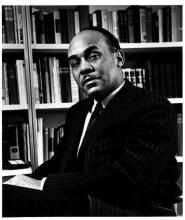The occupation of Haiti marks a new, hopeful era in U.S. relations with our neighbors in this hemisphere, signaling the birth of the "Clinton Doctrine"...
Commentary
Our faith has to be alive and light fires within our confused and fragile hearts or it is as meaningless as yesterday’s E-mail.
A tense, cautious hope for a peaceful future in Northern Ireland emerged with the cease-fire called on August 31 by the Irish Republican Army...
Imagine the situation if Jimmy Carter had not gone to North Korea this summer, and if Kim Il Sung’s death had come in the midst of a still-escalating crisis.
Indonesia’s brutal 19-year occupation of East Timor has caused the deaths of one-third of the island’s population—some 200,000 people—and shows no sign of letting up soon.

Labor Day: Justice. Workers. Solidarity. Sweat of the brow. Sixteen tons and what do you get? Another day older and deeper in debt.
Or...Picnics. Beaches. Hot dogs. TV telethons.
This is the common dilemma of Labor Day. This day of rest, set aside to honor labor, is usually remembered more for the fun things you do on a day off than for the workers it honors. This is certainly not unique—look at Memorial Day or Christmas and how easy it is to be so busy enjoying them that we forget what they're supposed to be about.
When trying to make sense of the world population picture, there are lies, damn lies, and there are global statistics. On one hand, the numbers "prove" that the world’s burgeoning population is outstripping the Earth’s carrying capacity, and that massive starvation is likely as the sheer weight of too many people overwhelms the ability of the environment to withstand the impact of human growth.
On the other hand, some would argue that the numbers "prove" that population growth is not the problem—because in some places, and in some eras, rapid population growth and prosperity have occurred simultaneously. The Nether-lands or Japan are usually touted as examples of countries with dense populations and healthy economies.
The relationship between population and poverty, and between the number of people in the world and their effects on the environment, isn’t as simple as the global statistics might indicate. Drought, war, corruption, inequitable distribution of power and wealth—all can be more devastating to the Earth and to people’s well-being than population growth per se.
But the unavoidable reality is that where there is severe poverty, where people are malnourished and re-sources are stretched thin, adding more people makes the suffering worse. Despite considerable increases in food production over the last three decades, there are more poor people in the world than ever before. Despite a global abundance of food, many people cannot afford enough to eat. And where survival competes with protecting the environment, increasing the number of people will only add to degradation of the land.
A ghastly holocaust has taken the lives of nearly a half-million people in Rwanda, and the international community has buried its head in the sand.
The media have generally depicted the genocide in Rwanda as just another ethnic-based conflict in Africa. Such a characterization has contributed to the general apathy, elicited feelings of helplessness, even donor fatigue, and provided an excuse for international inaction.
Racism is also driving the lack of international response. In less than five weeks, the numbers of people massacred in Rwanda exceeded the numbers of people slain in Bosnia after two years. But where is the international outrage against genocide in Rwanda? After six million Jews were exterminated in Hitler’s gas chambers, many in the West claimed they would have acted had they only known. They declared "never again." Well, it is happening again.
The butchery of an ethnic group has been captured on television and in front-page headlines. But U.N. Secretary General Boutros Boutros-Ghali’s pleas for urgent international intervention have been largely unheeded outside of Africa, as the United States and others debate whether, when, and how to stop the carnage.
In Rwanda, the massacres of Tutsi by Hutu are not the result of ethnic rivalry, but a struggle for power, at any cost. Contrary to media-incited opinion, tribal antagonism alone does not explain the Rwanda horror story, although ethnic divisions between Tutsi and Hutu do exist. The slaughter of Tutsi is a campaign of political violence carefully concocted and executed by a privileged and extremist element within the political and military leadership. This group of leaders, determined to block the implementation of reforms negotiated in August 1993, set out to annihilate Tutsi as well as kill any Hutu who agreed to the changes that would loosen their exclusive hold on power.
Mrs. S. had lived with progressive emphysema for years. During her last admission, she was brought gasping for breath into the emergency room of a local hospital. The staff asked if she wanted help breathing. She nodded her head "yes," and she was put on a respirator. Her niece arrived at the hospital hours later. She showed us her aunt’s Living Will, which specified no breathing machines. We followed her wishes. She died comfortably with her niece and daughter at her side.
Contrast Mrs. S.’s situation with people who are in nursing homes, unable to converse, walk, or eat, and whose lives are maintained with feeding tubes and aggressive care when they develop pneumonia or bedsores.
We have recently seen the death of Jackie Kennedy Onassis, who asked to leave the hospital, stop her treatments for cancer, and stop antibiotics so she could die as she had lived, privately and with dignity. Richard Nixon had a Living Will that specified he wanted no "heroics." He, too, was allowed to die as he wished. Decorated Vietnam veteran Lew Puller and Kurt Cobain, lead singer for Nirvana, ended their lives by suicide. Dr. Jack Kevorkian gives people the means to end their lives before their diseases do. Washington State recently overturned the ban on assisted suicide. Clearly as a society we are repeatedly challenged with life-and-death issues.
I have journeyed with persons who are ill, their families, and the staffs who take care of them. And I am a religious person committed to the sanctity of life. Some of the ethical principles involved in seeking guidelines about life and living and death and dying include autonomy or self-determination, beneficence, non-maleficence, fidelity, and justice.
As soon as the generals and the politicos
can predict the motions of your mind,
lose it. Leave it as a sign
to mark the false trail, the way
you didn’t go. Be like the fox
who makes more tracks than necessary,
some in the wrong direction.
Practice resurrection.
—Wendell Berry
Jacques Ellul died on May 19. The Washington Post noted his passing in a few scant paragraphs. It went unnoticed here in Detroit. Sojourners could readily devote an issue to him—and did just that in June 1977, acknowledging a debt to his thought and witness. He tutored many of us in theology and social history.
Personally, I was introduced to Ellul’s writing as a seminarian through Dan Berrigan, who was then reading the signs of the time with the Book of Revelation in one hand and Jacques Ellul’s Presence of the Kingdom (1948) in the other. Presence was Ellul’s postwar manifesto—and nearly five decades later it still rings true with an uncanny discerning prescience.
Removed as a professor of law by the Vichy government in 1940, he spent World War II in the French Resistance, spiriting Jews to safety. His postwar take on the times? Hitler won the war. The Nazi spirit triumphed. The atom bomb was emblem of the necessary "fact," the apotheosis of technique—of means overwhelming and supplanting ends.
The day after Richard Nixon’s funeral, The New York Times editorialized that the White House-sponsored occasion was a "rite of reconciliation" that brought "to a fitting end his 20-y
Inauguration day in South Africa had special significance for Dr. Beyers Naudé, and not just because the new South Africa was born as he celebrated his 79th birthday.
A welfare mother is a black woman, with several children, who spends her entire life on welfare, having another kid whenever she needs more money—at least according to prevalent stereotypes

When Ralph Ellison died this spring, he was primarily remembered and honored as the African-American writer who in 1952 had gifted the nation and the world with that magnificent novel, Invisib
Many of us would say, if we were to be honest, that we think NBA basketball is of a higher ilk than monster-truck pulls.
According to many political pundits—Left, Right, and Center—the era of battles over expanding opportunities and rights—be they civil, equal, or other—is nearly over. Over the
You might not like the Religious Right’s answers. But, on the subject of health reform, they at least ask some of the right questions.